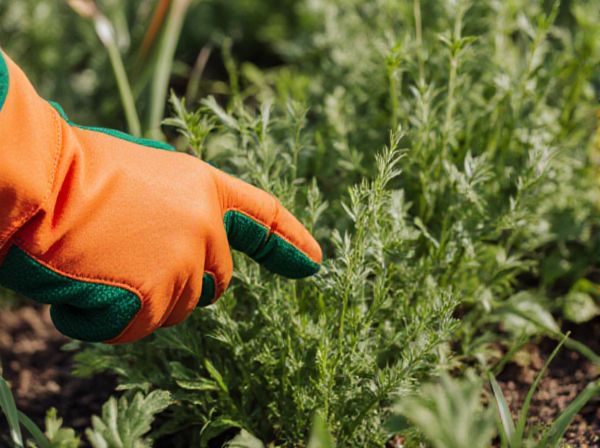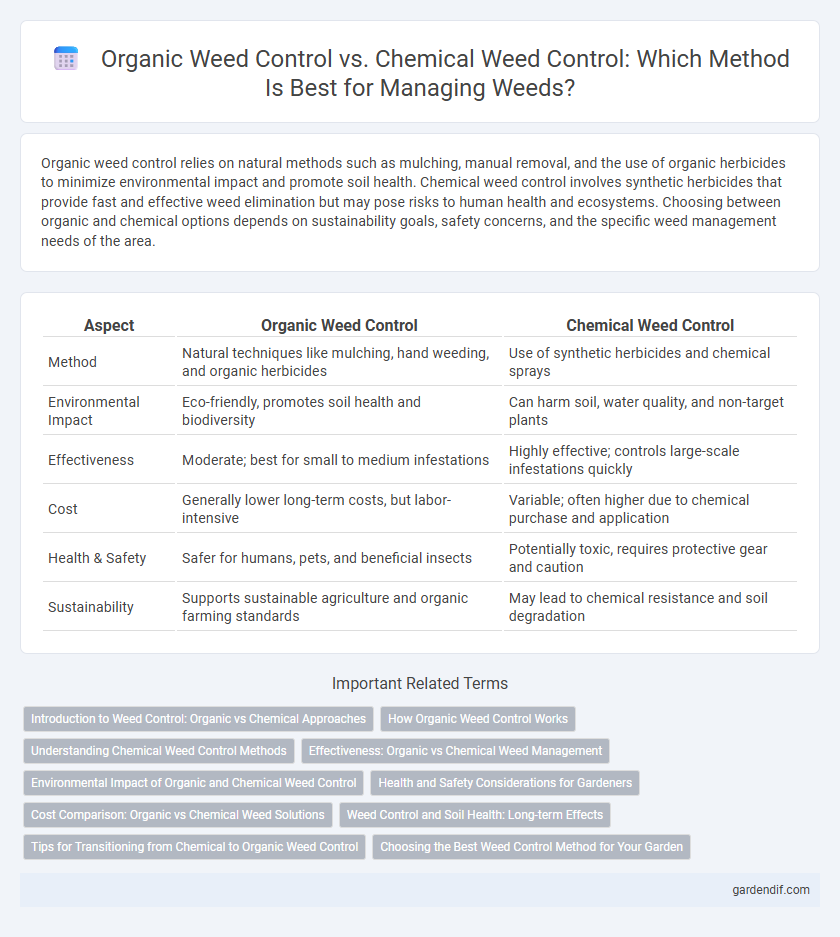
Organic weed control vs chemical weed control Illustration
Organic weed control relies on natural methods such as mulching, manual removal, and the use of organic herbicides to minimize environmental impact and promote soil health. Chemical weed control involves synthetic herbicides that provide fast and effective weed elimination but may pose risks to human health and ecosystems. Choosing between organic and chemical options depends on sustainability goals, safety concerns, and the specific weed management needs of the area.
Table of Comparison
| Aspect | Organic Weed Control | Chemical Weed Control |
|---|---|---|
| Method | Natural techniques like mulching, hand weeding, and organic herbicides | Use of synthetic herbicides and chemical sprays |
| Environmental Impact | Eco-friendly, promotes soil health and biodiversity | Can harm soil, water quality, and non-target plants |
| Effectiveness | Moderate; best for small to medium infestations | Highly effective; controls large-scale infestations quickly |
| Cost | Generally lower long-term costs, but labor-intensive | Variable; often higher due to chemical purchase and application |
| Health & Safety | Safer for humans, pets, and beneficial insects | Potentially toxic, requires protective gear and caution |
| Sustainability | Supports sustainable agriculture and organic farming standards | May lead to chemical resistance and soil degradation |
Introduction to Weed Control: Organic vs Chemical Approaches
Organic weed control employs natural methods such as mulching, hand weeding, and the use of beneficial cover crops to suppress weed growth without synthetic chemicals. Chemical weed control relies on herbicides designed to target and eliminate specific weed species quickly and effectively, often ensuring higher crop yields. Understanding the benefits and limitations of organic and chemical approaches is essential for choosing the most sustainable and efficient weed management strategy.
How Organic Weed Control Works
Organic weed control works by leveraging natural methods such as mulching, hand weeding, and the use of organic herbicides derived from plant-based ingredients or essential oils to suppress weed growth. These techniques improve soil health and encourage beneficial microorganisms, which create an inhospitable environment for weeds without harming crops or the ecosystem. Unlike chemical weed control, which uses synthetic chemicals to kill weeds, organic methods promote long-term sustainability and reduce chemical residues in soil and water.
Understanding Chemical Weed Control Methods
Chemical weed control methods involve the application of herbicides designed to target specific weed species while minimizing damage to desirable plants. These chemicals work by disrupting vital processes such as photosynthesis, protein synthesis, or cell division within the weed. Effective chemical weed control requires knowledge of herbicide types, application timing, and weed resistance management to ensure sustainable and efficient results.
Effectiveness: Organic vs Chemical Weed Management
Organic weed control relies on natural methods such as mulching, hand weeding, and organic herbicides derived from plant extracts, which are effective for small-scale or targeted weed management but may require more frequent application and labor. Chemical weed control uses synthetic herbicides that provide rapid and broad-spectrum weed suppression, demonstrating higher immediate effectiveness in large-scale agricultural systems. However, chemical methods can lead to resistance development in weeds and environmental concerns, while organic approaches promote long-term soil health and biodiversity.
Environmental Impact of Organic and Chemical Weed Control
Organic weed control methods minimize environmental harm by using natural substances that decompose quickly and do not leave harmful residues in soil or water. Chemical weed control often involves synthetic herbicides that persist in the environment, leading to soil degradation, water contamination, and adverse effects on non-target organisms such as beneficial insects and aquatic life. Sustainable weed management prioritizes organic approaches to maintain biodiversity, protect ecosystems, and reduce the long-term ecological footprint.
Health and Safety Considerations for Gardeners
Organic weed control methods minimize gardeners' exposure to harmful chemicals, reducing risks of skin irritation, respiratory problems, and long-term health effects linked to synthetic herbicides. Chemical weed control often involves substances like glyphosate, which carry concerns over toxicity and potential carcinogenicity, necessitating stringent protective gear and careful application to ensure safety. Using organic strategies such as mulching, hand weeding, and natural herbicides promotes a safer gardening environment by limiting chemical residues in soil and on plants.
Cost Comparison: Organic vs Chemical Weed Solutions
Organic weed control methods generally incur higher upfront costs due to labor-intensive practices and natural product expenses but offer long-term savings by improving soil health and reducing chemical dependency. Chemical weed control solutions often provide a lower initial cost and faster results but can lead to increased expenses over time from repeated applications, environmental impact mitigation, and potential regulatory compliance fees. Considering total costs, organic methods may prove more economical and sustainable in large-scale or long-term agricultural operations.
Weed Control and Soil Health: Long-term Effects
Organic weed control promotes soil health by enhancing microbial activity and maintaining nutrient balance, leading to improved soil structure and fertility over time. Chemical weed control can disrupt soil ecosystems and reduce beneficial organisms, resulting in nutrient depletion and potential soil degradation with prolonged use. Sustainable weed management practices that prioritize organic methods contribute to long-term soil resilience and productivity.
Tips for Transitioning from Chemical to Organic Weed Control
Transitioning from chemical to organic weed control requires gradually reducing synthetic herbicide use while enhancing soil health through organic mulches, compost, and cover crops that suppress weed growth. Consistent manual weeding and the introduction of natural weed predators help maintain control without chemicals. Monitoring soil pH and nutrient levels supports vigorous crop growth, making the environment less favorable for weeds.
Choosing the Best Weed Control Method for Your Garden
Organic weed control methods utilize natural materials like mulches, hand weeding, and biological agents, promoting soil health and reducing environmental impact. Chemical weed control employs synthetic herbicides that offer rapid and targeted weed elimination but may harm beneficial organisms and soil quality. Selecting the best method depends on garden size, weed type, environmental concerns, and long-term soil sustainability goals.
Organic weed control vs chemical weed control Infographic

 gardendif.com
gardendif.com